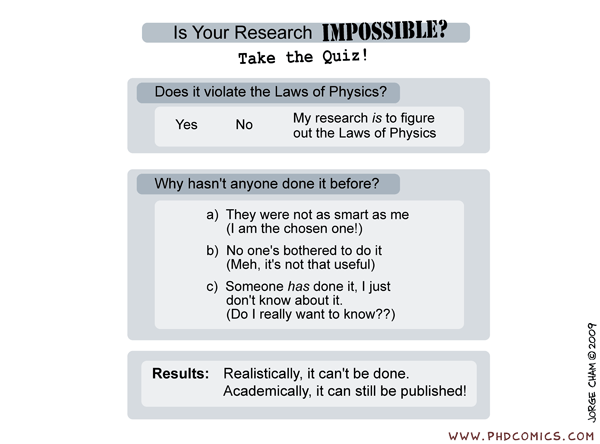An acerbic view of academic research, via the ever-wonderful Piled Higher and Deeper:
Author: Eoin
Tory Island and Unjust Enrichment – continued
 I wrote in April about the case brought by film-maker Neville Presho, whose holiday home on Tory Island had disappeared in his absence, replaced by a car park for an adjacent hotel. At that stage, Mr Justice Murphy suggested that there may be a restitution claim for the hotel’s use of the site as a car park, and adjourned the case to receive submissions as to remedy. He gave judgment yesterday (Belfast Telegraph | Irish Independent here and here | Irish Times | RTÉ news). Murphy J held that an equitable remedy lay not in the re-instatement of the original property but in the provision of a comparable dwelling on this island or its market value, and he adjourned to October the issue of which of those options should be chosen. And so we must wait some more to learn whether the remedy really is restitutionary or whether it is founded upon more general considerations.…
I wrote in April about the case brought by film-maker Neville Presho, whose holiday home on Tory Island had disappeared in his absence, replaced by a car park for an adjacent hotel. At that stage, Mr Justice Murphy suggested that there may be a restitution claim for the hotel’s use of the site as a car park, and adjourned the case to receive submissions as to remedy. He gave judgment yesterday (Belfast Telegraph | Irish Independent here and here | Irish Times | RTÉ news). Murphy J held that an equitable remedy lay not in the re-instatement of the original property but in the provision of a comparable dwelling on this island or its market value, and he adjourned to October the issue of which of those options should be chosen. And so we must wait some more to learn whether the remedy really is restitutionary or whether it is founded upon more general considerations.…
Another twist in the tale of the Defamation Bill
 The saga of the Defamation Bill, 2006 is not over yet. Article 26 of Bunreacht na hÉireann (the Irish Constitution) allows the President, after consultation with Council of State, to refer a Bill to the Supreme Court for a determination of its constitutionality. President McAleese has chosen to convene the Council of State to advise her on the qustion of whether to refer not only the (controversial) Criminal Justice (Amendment) Bill, 2009 (an unsurprising move) but also the (equally controversial) blasphemy elements of the Defamation Bill, 2006 (which has come as a great surprise). (See Belfast Telegraph | BreakingNews.ie | Bock the Robber | ICCL | Irish Emigrant | Irish Independent | RTÉ news | Irish Times | PA | Slugger O’Toole. Update (18 July 2009): see also Irish Examiner | Irish Times here and here | Irish Independent | MediaWatchWatch).
The saga of the Defamation Bill, 2006 is not over yet. Article 26 of Bunreacht na hÉireann (the Irish Constitution) allows the President, after consultation with Council of State, to refer a Bill to the Supreme Court for a determination of its constitutionality. President McAleese has chosen to convene the Council of State to advise her on the qustion of whether to refer not only the (controversial) Criminal Justice (Amendment) Bill, 2009 (an unsurprising move) but also the (equally controversial) blasphemy elements of the Defamation Bill, 2006 (which has come as a great surprise). (See Belfast Telegraph | BreakingNews.ie | Bock the Robber | ICCL | Irish Emigrant | Irish Independent | RTÉ news | Irish Times | PA | Slugger O’Toole. Update (18 July 2009): see also Irish Examiner | Irish Times here and here | Irish Independent | MediaWatchWatch).
There have been 15 such references to date. If the Court holds that a Bill is unconstitutional, the President must decline to sign it; whilst if the Court decides a Bill is constitutional, the President must sign it into law, and the resulting Act is immune from constitutional challenge in the future.…
Seeing justice done?
 As the slow march towards a new Supreme Court for the UK nears its destination, the Times has a piece about its newly refurbished premises:
As the slow march towards a new Supreme Court for the UK nears its destination, the Times has a piece about its newly refurbished premises:
The United Kingdom’s new Supreme Court will open its doors for business on October 1, with the first inbuilt facilities in Britain for broadcasting in court. … Broadcasting and internet arrangements are still to be devised but the three courts (two for the Supreme Court, one for the judicial committee of the Privy Council) can be filmed, a first in England and Wales.
As the BBC story on the completion of the refurbishment emphasises, the “decision to televise events from inside the court’s three chambers is a first for England and Wales”. And the Guardian quotes Jenny Rowe, the Court’s Chief Executive as saying that they are “in advanced discussions with broadcasters about the material they will want to use … If broadcasters wish to show it we will make it available”.
I think that it is a splendid idea. As the Canadian blawgs Slaw and the Court point out, since February 2009, the Supreme Court of Canada has provided live streaming of oral arguments and judges’ questions in authorized cases. The whole experiment is working well, and doing the same in the UK is an excellent development.…
New Open Source Law Journal
 The European Legal Network, a professional network of legal experts facilitated by the Freedom Task Force which promotes free software licensing as part of the work of the Free Software Foundation Europe, has just announced the launch of the International Free and Open Source Software Law Review. It is a peer reviewed biannual journal for high-level analysis and debate about Free and Open Source Software legal issues, and it will receive financial and administrative support from the NLNet Foundation, which supports organizations and people that contribute to an open information society. Edited by Andrew Katz and Amanda Brock, its focus includes copyright, licence implementation, licence interpretation, software patents, open standards, case law and statutory changes. Unsurprisingly, it operates a strong Open Access Policy, providing immediate open access to its content on the principle that making research freely available to the public supports a greater global exchange of knowledge.
The European Legal Network, a professional network of legal experts facilitated by the Freedom Task Force which promotes free software licensing as part of the work of the Free Software Foundation Europe, has just announced the launch of the International Free and Open Source Software Law Review. It is a peer reviewed biannual journal for high-level analysis and debate about Free and Open Source Software legal issues, and it will receive financial and administrative support from the NLNet Foundation, which supports organizations and people that contribute to an open information society. Edited by Andrew Katz and Amanda Brock, its focus includes copyright, licence implementation, licence interpretation, software patents, open standards, case law and statutory changes. Unsurprisingly, it operates a strong Open Access Policy, providing immediate open access to its content on the principle that making research freely available to the public supports a greater global exchange of knowledge.
 Given recent developments relating to Creative Commons licences for Ireland, I was particularly taken by two pieces in the first issue discussing Jacobsen v Katzer and Kamind Associates 535 F.3d 1373 (Fed.Cir.2008) (pdf), in which the Court of Appeals for the Federal Circuit granted a preliminary injunction to enforce the terms of the OSI‘s open source Artistic Licence (see JOLT | Lessig | OSI | Stanford CIS; Brian F Fitzgerald and Rami Olwan “The legality of free and open source software licences: the case of Jacobsen v.…
Given recent developments relating to Creative Commons licences for Ireland, I was particularly taken by two pieces in the first issue discussing Jacobsen v Katzer and Kamind Associates 535 F.3d 1373 (Fed.Cir.2008) (pdf), in which the Court of Appeals for the Federal Circuit granted a preliminary injunction to enforce the terms of the OSI‘s open source Artistic Licence (see JOLT | Lessig | OSI | Stanford CIS; Brian F Fitzgerald and Rami Olwan “The legality of free and open source software licences: the case of Jacobsen v.…
Traffic Data Retention, Irish-style, returns to the legislative agenda
 The Communications (Retention of Data) Bill 2009, published last week, has caused a bit of a stir in this morning‘s newspapers. It will give effect to EU Data Retention Directive 2006/24/EC of 15 March 2006 (blogged here) which recently survived challenge by the Irish Government in the European Court of Justice, and it will replace the radically misconceived and deeply flawed stop-gap Part 7 of the Criminal Justice (Terrorist Offences) Act, 2005 (also here) (blogged here).
The Communications (Retention of Data) Bill 2009, published last week, has caused a bit of a stir in this morning‘s newspapers. It will give effect to EU Data Retention Directive 2006/24/EC of 15 March 2006 (blogged here) which recently survived challenge by the Irish Government in the European Court of Justice, and it will replace the radically misconceived and deeply flawed stop-gap Part 7 of the Criminal Justice (Terrorist Offences) Act, 2005 (also here) (blogged here).
In essence, the Bill requires telecommunications companies, internet service providers, and the like, to retain data about communications (though not the content of the communications); phone and mobile traffic data have to be retained for 2 years; internet communications have to be retained for one year. This is better than it could have been, in that the Directive would have allowed 2 years for all traffic data; but it is a lot worse than the minimum of 6 months allowed by the Directive. This will impose significant costs on those obliged to retain and secure the data, and those costs will be passed on to their already hard-pressed customers. And it is likely to drive international telecommunications and internet companies to European states which have introduced far less demanding regimes.…
Legal Alchemy
 Albie Sachs is a remarkable man. His official bio begins
Albie Sachs is a remarkable man. His official bio begins
On turning six, during World War II, Albie Sachs received a card from his father expressing the wish that he would grow up to be a soldier in the fight for liberation.
He began that fight as a seventeen year old law student; as a lawyer, the bulk of his work involved defending people charged under apartheid’s racist and repressive security laws – many of them faced the death penalty. As a result he was harassed by the security police, detained in solitary confinement for two prolonged spells of detention, tortured by sleep deprivation, forced into exile in 1966, and in 1988 blown up by a car bomb which cost him his right arm and the sight of an eye. In exile, he worked as an academic in the UK and Mozambique, campaigned for human rights and an end to apartheid, and thought deeply and wrote widely about the role of law as a protector of human dignity in the modern world. He wrote many of the ANC’s constitutional documents, helped to negotiate South Africa’s transition to constitutional democracy and to draft its post-apartheid Constitution, and was one of the founding judges of the Constitutional Court in 1994.…
So am I?
Via Peter Black’s Freedom to Differ blog, I came across this video from the Society for Geek Advancement:
…

